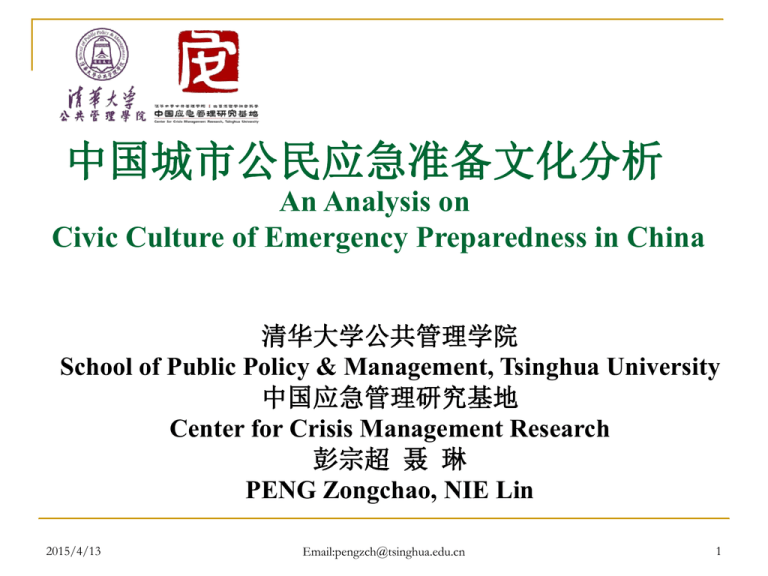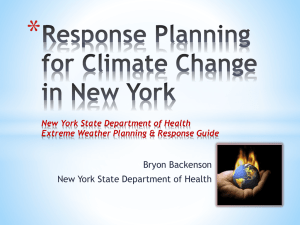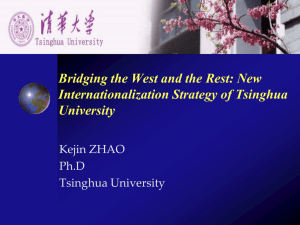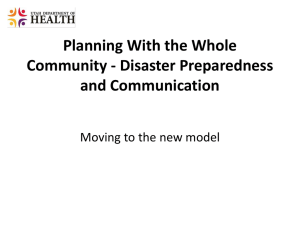中国城市公民应急准备文化的调研分析
advertisement

中国城市公民应急准备文化分析 An Analysis on Civic Culture of Emergency Preparedness in China 清华大学公共管理学院 School of Public Policy & Management, Tsinghua University 中国应急管理研究基地 Center for Crisis Management Research 彭宗超 聂 琳 PENG Zongchao, NIE Lin 2015/4/13 Email:pengzch@tsinghua.edu.cn 1 内容提纲 Outline 研究背景与基本概念 Background and Basic Concepts 研究框架与调研方法 Framework and Methodology 统计与相关性分析 Statistics and Correlation Analysis 城市比较分析 Comparative Analysis among Cities 结论与建议 Conclusion and Suggestions 2015/4/13 Email:pengzch@tsinghua.edu.cn 2 1. 研究背景与基本概念 Background and Basic Concepts “如果不了解文化,风险管理将毫无 意义” —玛丽·道格拉斯《风险与文化》 “Without understanding of Culture, Risk Management would be meaningless” —Mary Douglas Risk and Culture 2015/4/13 Email:pengzch@tsinghua.edu.cn 3 1. 研究背景与基本概念 Background and Basic Concepts 应急准备文化是文化及应急文化大系统之下的 一个子系统。在广义上,它指公民应对危机事 件应急准备的意识和行为;在狭义上,它仅指 公民的应急准备意识。 Civic Culture of Emergency Preparedness is a subsystem of Culture and Emergency Culture. In a broad sense, it includes Emergency Perception and Preparedness Behavior; In a narrow sense, it refers to Emergency Perception. 2015/4/13 Email:pengzch@tsinghua.edu.cn 4 2. 研究框架与调研方法 Framework and Methodology 2015/4/13 Email:pengzch@tsinghua.edu.cn 5 2. 研究框架与调研方法 Framework and Methodology 委托清华大学媒介调查实验室,于2011年12月28日—2012年1 月5日间,进行了一次全国范围的拦访式问卷调研,共涉及中 国东、中、西部六个城市。此次调研共发放问卷582份,回收 有效问卷504份,其中北京83份,济南88份,郑州88份,武汉 83份,成都86份,银川76份。被访者总体的性别、年龄、职业、 受教育程度、月收入、居住地、婚姻状况均与中国第六次人口 普查统计的人口结构相符,因此,此次的抽样是比较有代表性 的。 From Dec. 28, 2011 to Jan. 5, 2012, the survey on Civic Culture of Emergency Preparedness in China was conducted in 6 cities, in the form of random interview on streets. 582 questionnaires were distributed and a representative sample of 504 respondents was collected (Beijing 83, Jinan 88, Zhengzhou 88, Wuhan 83, Chengdu 86, Yinchuan 76). 2015/4/13 Email:pengzch@tsinghua.edu.cn 6 2. 研究框架与调研方法 Framework and Methodology 问卷说明 Questionnaire : 我们在每一类突发公共事件中选择两个典型且与日常生活 关系较密切的事件:地震、洪水(自然灾害类);火灾、 交通事故(事故灾难类);流行性传染病、地方病(公共 卫生事件类);治安事件、群体性上访(社会安全事件 类)。具体考察8项危机事件中公民的应急准备文化。 We selected 8 emergencies that are typical and closely related to daily life, to test civic culture of emergency preparedness. The 8 emergencies are Earthquake, Flood, Fire, Traffic Accident, Endemic, Epidemic, Security Events, Group Petition. 2015/4/13 Email:pengzch@tsinghua.edu.cn 7 3. 统计与相关性分析 Statistics and Correlation Analysis 1. 公民对各项危机事件发生可能性的估计 Estimation of Crisis Possibility (1-5 from the lowest to the highest, n=no idea) 2015/4/13 Email:pengzch@tsinghua.edu.cn 8 3. 统计与相关性分析 Statistics and Correlation Analysis 2. 公民对各项危机事件对生活的影响程度估计 Estimation of Crisis Effect (1-5 from the lowest to the highest, n=no idea) 2015/4/13 Email:pengzch@tsinghua.edu.cn 9 3. 统计与相关性分析 Statistics and Correlation Analysis 3. 公民对地方政府处理各项危机事件的满意度 Satisfaction of the Local Government (1-5 from the lowest to the highest, n=no idea) 2015/4/13 Email:pengzch@tsinghua.edu.cn 10 3. 统计与相关性分析 Statistics and Correlation Analysis 4. 公民对中央政府处理各项危机事件的满意度 Satisfaction of the Central Government (1-5 from the lowest to the highest, n=no idea) 2015/4/13 Email:pengzch@tsinghua.edu.cn 11 3. 统计与相关性分析 Statistics and Correlation Analysis 5. 公民对自身应对各项危机事件的自信程度 Confidence in Dealing with Crisis (1-5 from the lowest to the highest, n=no idea) *群体性上访的应 对和处理是政府 的职责,因此该 问题中不涉及公 民应对群体性上 访的自信度。 *It is the government’s responsibility to deal with group petition, which was excluded from this question. 2015/4/13 Email:pengzch@tsinghua.edu.cn 12 3. 统计与相关性分析 Statistics and Correlation Analysis 6. 公民对各项危机事件应急准备行为的实施数量 Preparedness Behaviors 0 1 2 3 4 5 6 7 8 9 10 all 地震Earthquake 252 52 70 64 26 21 11 3 5 504 % 50 10.3 13.9 12.7 5.2 4.2 2.2 0.6 1 100 洪水Flood 304 51 56 59 21 7 3 2 1 504 % 60.3 10.1 11.1 11.7 4.2 1.4 0.6 0.4 0.2 100 火灾Fire 130 133 79 57 50 26 16 5 3 2 3 504 % 25.8 26.4 15.7 11.3 9.9 5.2 3.2 1 0.6 0.4 0.6 100 交通事故 128 124 153 70 19 5 5 504 Traffic Accident % 25.4 24.6 30.4 13.9 3.8 1 1 100 流行性传染病 74 73 102 114 74 34 20 11 2 504 Epidemic % 14.7 14.5 20.2 22.6 14.7 6.7 4 2.2 0.4 100 治安事件 315 78 78 23 7 2 1 504 Security Events % 62.5 15.5 15.5 4.6 1.4 0.4 0.2 100 2015/4/13 Email:pengzch@tsinghua.edu.cn *地方病的应急准 备行为以有/无准 备来考察,有/无 的比例分别为 31.2%和68.8%; **群体性上访的 处理是政府行为, 因此该问题不涉 及公民对群体性 上访的应急准备 行为。 *Preparedness in Endemic was tested by Done/Not, and the percentage was 31.2%/68.8%; **Due to the government’ responsibility, preparedness in Group Petition was excluded from this question. 13 3. 统计与相关性分析 Statistics and Correlation Analysis 7. 公民对各项危机事件的情感分布情况 Affect (喜欢,期盼) (喜欢,恐惧) (厌恶,期盼) (厌恶,恐惧) 地震 (Fond, Hope) 3 (Fond, Fear) 5 (Hate, Hope) 3 (Hate, Fear) 493 Earthquake 洪水 1 3 3 497 Flood 火灾 1 2 0 501 Fire 交通事故 0 2 0 502 Traffic Accident 地方病 3 4 0 497 Endemic 流行性传染病 3 5 3 493 Epidemic 治安事件 0 1 1 502 Security Event 群体性上访 33 7 2 462 Petition 2015/4/13 Email:pengzch@tsinghua.edu.cn 14 3. 统计与相关性分析 Statistics and Correlation Analysis 8. 公民不进行应急准备的原因 Why is it difficult for you to execute preparedness behavior 2015/4/13 Email:pengzch@tsinghua.edu.cn 1. 不知道该做什么 I do not know what to do 2. 担心这些做法无实效 I worry about the actual result 3. 这些做法太浪费时间 Waste of time 4. 这些做法太浪费金钱 Waste of money 5. 已买保险,保险公司会赔 I can depend on insurance company 6. 存在侥幸心理 fluke mind 7. 我更倾向于接受政府提供 的帮助而非自主预防 I prefer the help from the government rather than myself 15 3. 统计与相关性分析 Statistics and Correlation Analysis Correlation Analysis 1. 在交通事故、地方病两项危机事件中,被访者对危机事件发生可能 性的估计与应急准备行为数量正相关; In the cases of Traffic Accident and Epidemic, respondents' estimation of crisis possiblity is positively correlated with the number of preparedness behaviors; 2. 在地震、流行性传染病两项危机事件中,影响程度估计与应急准备 行为数量负相关; In the cases of Earthquake and Epidemic, respondents' estimation of crisis effect is negatively correlated with the number of preparedness behaviors; 3. 在五项危机事件中(地震、交通事故、地方病、治安事件、群体性 上访),被访者对政府的满意度与应急准备行为实施情况负相关 In 5 crisis events (Earthquake, Traffic Accident, Endemic, Security Events, Group Petition),there are negative correlations between government evaluation and preparedness: those who are more satisfied with the government would take less preparedness behaviors. 2015/4/13 Email:pengzch@tsinghua.edu.cn 16 3. 统计与相关性分析 Statistics and Correlation Analysis 4. 社会背景对应急准备文化的影响 Influence of Social Status : (1)公民的危机经历 Crisis Experience “经历”在5 项危机事件中(地震、洪水、火灾、交通事故、地方病) 表现为对可能性估计的正向影响;在3 项危机事件中(洪水、交通事 故、流行性传染病)表现为对自信程度的正向影响。即有过某项危机 事件经历的公民对该项危机事件发生的可能性估计和应对该项危机事 件的自信度都会更高。 In 5 crisis events (Earthquake, Flood, Fire, Traffic Accident, Endemic), experience positively influences people's estimation of crisis possibility; In 3 crisis events (Flood, Traffic Accident, Epidemic), experience positively influence people's confidence. Consequently, people who have experienced certain crisis would pay more attention to the same crisis in the future and be more confident in dealing with the crisis. 2015/4/13 Email:pengzch@tsinghua.edu.cn 17 3. 统计与相关性分析 Statistics and Correlation Analysis (2) 公民的年龄 Age “年龄”对于公民对政府的评价有重要影响。在4 项危机事件中 (地震、洪水、火灾、流行性传染病),年龄表现出对满意度的 正向影响;只有在群体性上访中,公民年龄与政府满意度负相关。 Age plays a significant role in respondents' satisfaction of the local and central government. In 4 crisis events (Earthquake, Flood, Fire, Epidemic), age positively correlates with people's satisfaction of government; While only in the case of Group Petition, age has negative correlation with government evaluation. 2015/4/13 Email:pengzch@tsinghua.edu.cn 18 4. 城市比较分析 Comparative Analysis among Cities 应急准备文化发展较好的城市为银川 (西夏文化),欠发展的城市为成都 (巴蜀文化)和武汉(荆楚文化), 北京(燕京文化)、济南(齐鲁文 化)、郑州(中原文化)三市的应急 准备文化发展现状居于中间水平。 Civic Culture of Emergency Preparedness is well developed in Yinchuan (Xixia Culture Sysetm), and is less developed in Chengdu (Bashu Culture System) and Wuhan (Jingchu Culture System); In Beijing (Yanjing Culture System), Jinan (Qilu Culture System), and Zhengzhou (Zhongyuan Culture System), Civic Culture of Emergency Preparedness is developing. 2015/4/13 Email:pengzch@tsinghua.edu.cn 19 4. 城市比较分析 Comparative Analysis among Cities 各城市公民自身应对地震的自信程度 Confidence in Dealing with Earthquake 各城市公民地震应急准备 行为的实施情况 Preparedness Behavior on Earthquake 2015/4/13 Email:pengzch@tsinghua.edu.cn 20 4. 城市比较分析 Comparative Analysis among Cities 各城市公民洪水应急准备行为实施情况 Preparedness Behavior on Flood 各城市公民对洪水发生可能性的估计 Estimation of Flood Possibility 2015/4/13 Email:pengzch@tsinghua.edu.cn 21 4. 城市比较分析 Comparative Analysis among Cities 各城市公民对中央政府处理群 体性上访的满意程度 Satisfaction of the Central Government in Group Petition 各城市公民对地方政府处理 群体性上访的满意程度 Satisfaction of the Local Government in Group Petition 2015/4/13 Email:pengzch@tsinghua.edu.cn 22 5. 结论与建议 Conclusion and Suggestion 整体来看,我国公民应急准备文化表现为:低水平的应急认知、负 面的应急情感、较高的政府满意度、较低的自信度和非常不主动的 应急准备行为。造成应急准备文化不发达现状的原因可以归纳为: 公民对应急准备常识的认知盲区、对政府的过度依赖、以及消极的 文化心理因素。 Overall, the Civic Culture of Emergency Preparedness in China consists of low-level emergency cognition, negative emergency affect, high-level government evaluation, low-level confidence in dealing with crisis, and passive preparedness behavior. Reasons for undevelopment of Civic Culture of Emergency Preparedness include lack of common sense in emergency preparedness knowledge, overly dependent on government help, and negative cultural and psychological factors. 2015/4/13 Email:pengzch@tsinghua.edu.cn 23 5. 结论与建议 Conclusion and Suggestion 中国公民应急准备文化的发展建议 Suggestions to development of Civic Culture of Emergency Preparedness in China: 以公民自身为动力,通过加强应急准备主动性、吸取经验教训、 培养健康的人生观和价值观,强化个体公民的应急准备文化; The citizen, as the motive power , should enhance individual emergency preparedness power via higher level of initiative, lessons from past experience and healthier lookout and value towards life; 以政府为主导,通过应急管理能力的提高、立法的完善、宣传力 度的加强,强化政府内部和全社会的应急准备文化 The government, as the leading power, should improve emergency management capability, perfect the legislation, and enhance public awareness, in order to strengthen the civic culture of emergency preparedness within the government and in the whole society 2015/4/13 Email:pengzch@tsinghua.edu.cn 24 2015/4/13 Email:pengzch@tsinghua.edu.cn 25





